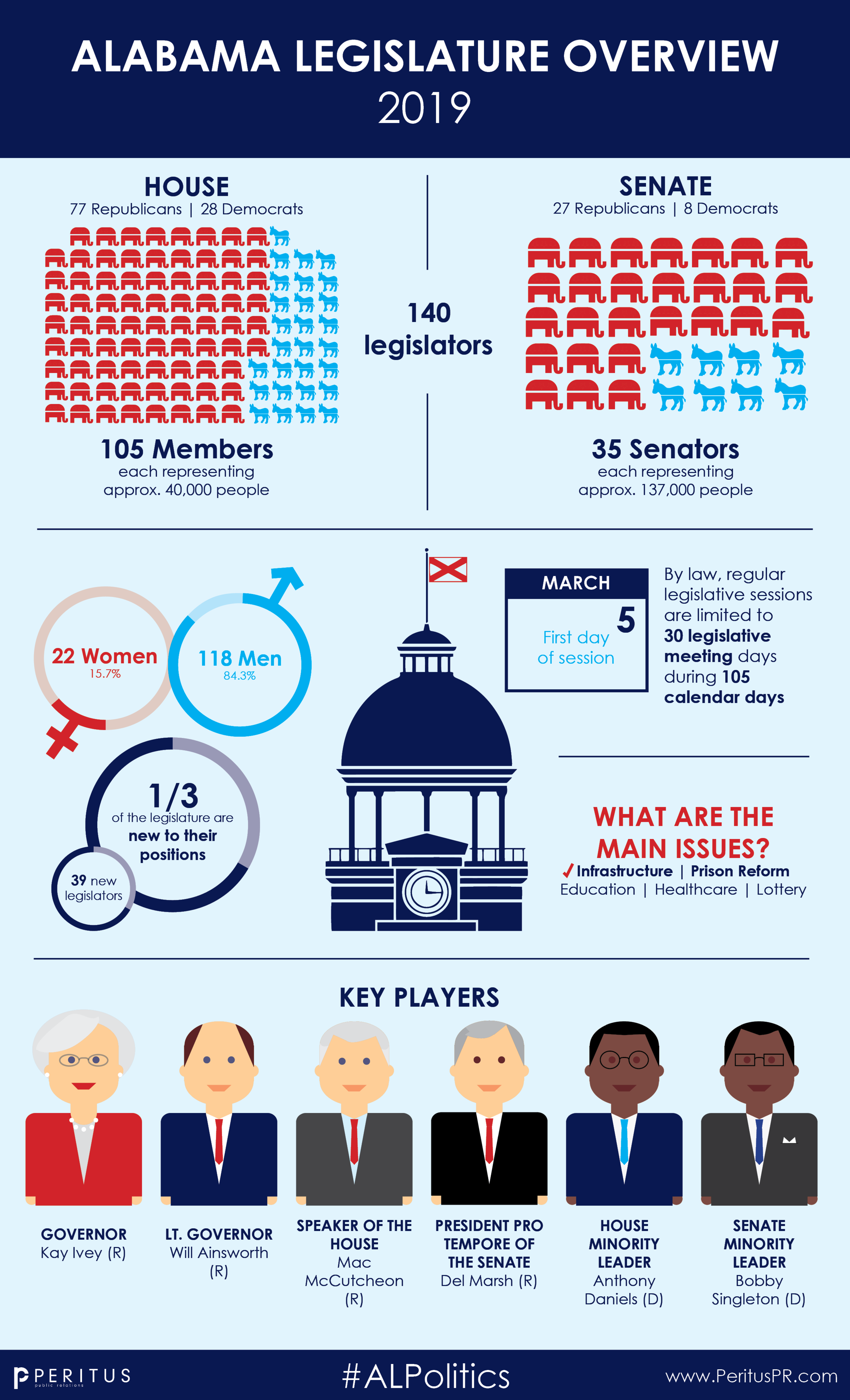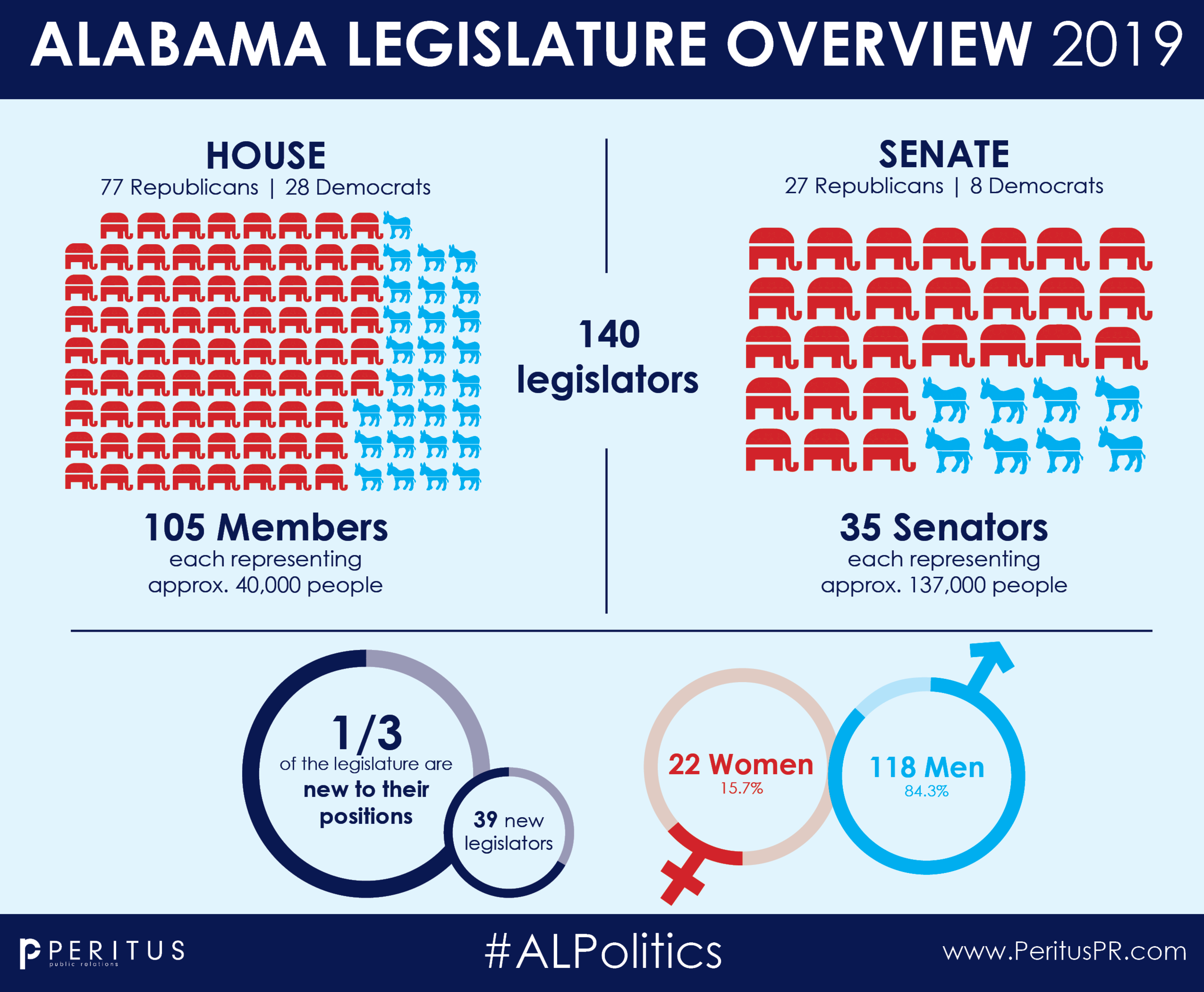2019 Guide to the Alabama Legislative Session
Guess who’s back, back again…
In the South, we are taught to avoid discussing religion and politics (and often college football) in mixed company. But when it comes to being knowledgeable about Alabama’s legislative process and issues impacting our state, our team makes an exception.
Since PERITUS specializes in public affairs issues, we often are asked by peers to break down issues and takeaways from the Legislative Session.
In case you have been enjoying Mardi Gras festivities and arriving late to the news cycle headlines, on March 5 the Alabama Legislature returned to Montgomery to kick off the 2019 Legislative Session.
As we gear up for the all the legislative action, we wanted to provide a quick session guide—what you need to know, top issues to follow and how to stay informed.
So, let’s get scrolling.
Legislative Session 101
Here’s a quick backgrounder on the basics for those that need a refresher
When you say the legislature (air quotes) is meeting for session, you mean…?
The session is a time for our legislature—elected state senators and representatives—to come together and debate policies and issues impacting the state through introduced bills. However, constitutionally, the only thing the legislature is required to do when they meet is pass the budget. The budget is how we fund things like education, state agencies, roads, public safety, state parks, the prison system, Medicaid, etc. Fun fact: Alabama is one of three states who have two separate budgets (the General Fund and the Education Trust Fund). The Education Trust Fund (ETF) covers (you guessed it) education, from Pre-K to higher education, and the General Fund (GF) covers the rest, including the operations of our executive, legislative and judicial branches.
When does the legislature meet?
Go-time for the 2019 regular session began at noon on Tuesday, March 5. By law, regular legislative sessions are limited to 30 legislative meeting days during 105 calendar days. Normally, the legislature is in session Tuesdays and Thursdays, while the legislative committees meet on Wednesdays.
What makes this 2019 session significant?
2019 is the first year in the new quadrennium (fancy way of saying four years). Every quadrennium, the House and Senate are required to reorganize which sometimes shakes things up with leadership. With newly elected members in both the House and Senate, the legislature met back in January where they elected officers, adopted rules and received committee assignments. Following November’s election, there are 41 new legislators (29 in the House and 12 in the Senate).
How have things been going so far?
Governor Kay Ivey kicked things off by delivering her State of the State address where she covered her policy priorities (infrastructure, education, job growth, prison reform and healthcare to name a few) and what she hopes to accomplish moving forward. Following the State of the State, she called for a Special Session to address the need for a fuel tax increase to fund infrastructure improvements. The Special Session proved to be successful for Gov. Ivey with the Rebuild Alabama Act passing both the House and Senate (more on this later).
Legislative Priorities
To spark conversations with your politically savvy friends, here is what everyone is talking about
Infrastructure
What do I need to know about infrastructure?
If you’ve driven on I-65, watched the evening news or live in a rural area, you probably know that Alabama has an infrastructure problem. This has been a top priority for Gov. Ivey, so much that she called a Special Session and knocked it out of the park. The legislation calls for called for a 10 cents-per-gallon fuel tax over three years (from 18 cents to 28 cents). Many groups in the state thought we should consider a few different options before increasing taxes but the Rebuild Alabama Act passed both the House and Senate by an overwhelming majority. This is a huge victory and bold statement for Ivey.
Proponents are saying… “Put the pedal to the metal.”
It’s time to invest in Alabama. While 37 other states have increased their infrastructure revenue in the past five years, this is the first fuel tax increase since 1992. This investment in infrastructure will pave the way for more business growth and economic development opportunities.
Opponents are saying… “Let’s pump the brakes.”
While everyone agrees that something needs to be done about the state’s infrastructure, many believe that increasing taxes is not the way to go. Legislators on both sides of the aisle raised concerns about taxpayers, alternative ways to pay for this and other state priorities.
What’s next?… “And now back to our regularly scheduled programming.” With Gov. Ivey signing the Rebuild Alabama Act into law Tuesday afternoon, the legislature will move on to the regular session where it will address other state priorities like prison reform, education and Medicaid expansion.
Prison Reform
What do I need to know about prison reform?
Alabama’s prisons are in bad shape and something needs to be done to address ongoing issues like overcrowding, violence and mental health. Lawmakers are looking to address criminal justice reform stemming from recent federal lawsuits calling for an overhaul of the state’s prison and mental health systems. In February, Gov. Ivey announced a plan to build three new regional prisons that will house thousands of prisoners with a causal price tag of $900 million.
Proponents are saying… “We got this.”
Gov. Ivey is leading the charge for prison reform in the state, saying there’s issues of violence, poor living conditions and mental illness persisting within our prison system. The Alabama Department of Corrections will request bids for the construction of three new men’s prisons, which will not require the legislature to appropriate any funds. Ivey’s bold plan would allow the state to address prison reform without the federal courts stepping in again.
Opponents are saying… “Let’s take a step back.”
Many opponents argue that building new prisons and shutting down the old ones won’t solve the problem. The state should look beyond just prison construction and address the root of what’s causing problems like understaffing, mental health care and education before spending $900 million.
What’s next? Prison reform is an issue that the legislature will take up during the session and one of which that many legislators have strong opinions. Stay tuned to see how the plan evolves and the resulting potential for new components such as education reform.
Let’s break down other issues that will be high on the priority list this session…
Education – Show me the money.
This year, the Education Trust Fund (ETF) is in better shape than it has been in years past which is good news for the state’s education system and Alabama’s teachers. In her state of the state address, Governor Ivey called for a four percent cost of living increase for teachers. Educators last received a pay increase in 2018. Gov. Ivey also proposed a $25 million increase in the state’s Pre-K program. The legislature will also take up other education reform bills that could take a comprehensive approach to improving state’s education system and funding for colleges, universities and workforce initiatives.
Healthcare – Doctor’s orders.
Access to affordable healthcare continues to be a major concern across the state. Alabama has not accepted federal funding under the Affordable Care Act, but with recent hospital closings (13 since 2011), especially in rural areas, many groups are saying the time to expand Medicaid is now. Medicaid provides free or low-cost health coverage for low-income and needy people. It’s funded through federal, state and county dollars. While Democrats and the health industry continue to push for expansion, Republicans and leadership who are concerned about more government spending and the state’s ability to afford it are unwilling to support expansion. With increased conversations about the need to expand Medicaid, this may make some movement during the session.
Lottery – Party of five.
Alabama is one of only five states without a state lottery. Sen. Jim McClendon (R-Springville) is bringing back legislation that would establish a state lottery (think Powerball and Mega Millions) through a constitutional amendment that would be decided on by Alabama voters on a statewide ballot. McClendon’s other bill would allocate where the lottery revenue would go by splitting between the ETF and the General Fund. With discussions of a proposed gas tax, many believe it could give the lottery issue a new lease on life.
How do I keep up?
To stay connected on all sides of the discussions and keep up with real-time and daily updates, here are some recommendations on how to stay in the know:
During the legislative session, there are many moving parts and things can shift quickly. We prefer Twitter to stay up to date on all things #ALPolitics. If you didn’t know, following or viewing the hashtag on Twitter, Facebook and even Instagram allows you to get real-time updates and a full view on the conversation surrounding our state’s politics and policy scene. Below are some of our go-to Twitter accounts and news outlets for all the State House news and happenings.
First thing’s first.
To follow updates from around the state, it’s important to follow Alabama’s top dogs on Twitter:
Governor Kay Ivey – @GovernorKayIvey
Lt. Governor Will Ainsworth – @willainsworthAL
Speaker of the House Mac McCutcheon – @MacDistrict25
Senate President Pro Tempore Del Marsh – @SenatorDelMarsh
House Minority Leader Anthony Daniels — @AnthonyDaniels
Senate Minority Leader Bobby Singleton — @bsingle362
House Majority Leader Nathaniel Ledbetter — @RepLedbetter24
Senate Majority Leader Greg Reed — Greg Reed
Alabama Daily News – @ALDailyNews
Your source for top news from the state, all in one convenient place. @ToddStacy delivers a witty and informative look at Alabama politics to your inbox every morning through the Alabama Daily News newsletter.
Brian Lyman – @lyman_brian
Brian has been an #ALPolitics staple for years and his reporting is top-notch. Follow Brian for real time updates and extensive coverage of political news from the State House and around Alabama on Twitter and in the Montgomery Advertiser.
Mike Cason – @MikeCasonAL
Like Brian, Mike covers state news for the Alabama Media Group, which includes @aldotcom, The Birmingham News, The Huntsville Times and the Mobile Press-Register. His boots-on-the-ground updates offer an inside look into State House happenings.
Kim Chandler – @StatehouseKim
Often sharing real-time updates, Kim is Alabama’s State House reporter for the Associated Press, and her feed provides a look at state political news, happenings on Alabama’s congressional delegation and news in Washington.
Alabama Politics – @AlabamaPolitics
For strictly politically and policy-centered content from around the state, Alabama Politics provides up-to-the minute political coverage for a comprehensive look at the top news of the day.
Our PUBLISHED by Peritus takeaway is this:
The decisions made by lawmakers in Montgomery are important and impact what we do in our everyday lives across the state. We are fortunate to live in a country where we can play a role in the decisions that are made. You don’t have to be a politico to keep up with the Session, and we encourage you to stay informed on what’s going on in Montgomery (with guides like ours) and the issues that will impact the future of the state. If anything, you can discuss politics in mixed company, in front of clients, at your next networking event or around the dinner table.




